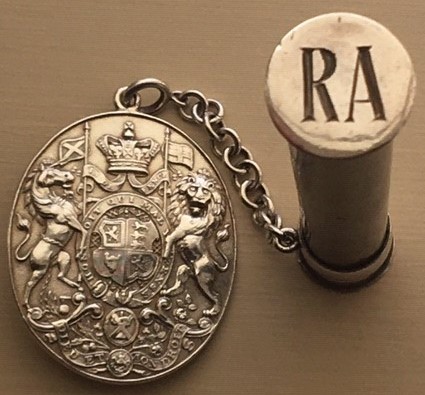Simply put, we serve legal documents. Shakespeare gives us this job title: ‘a process server’ (The Winter’s Tale, IV,3,102). But the right words in Scotland are different. Scots law’s term for serving legal documents is citation. In French, la signification des actes is the term, remining us of the old Scots word for a pursuivant of arms, signifer, as one who anciently performed the act of citation wearing a tabard bearing the ensigns of public authority: the royal arms. Service in Scotland by private process server is not authorised. That is because Scotland, since the Citation Act 1540, has had a statutory ‘ordour of summounding of all persones in civil actiones’, which requires service by an appropriate officer.
At common law, a messenger-at-arms is the competent officer for the service in Scotland of all court documents, subject to certain statutory restrictions. This position was clearly expressed by Sir Francis J. Grant, Lord Lyon, in a handwritten letter in 1939 to my grandfather. The correspondence was prompted by a sheriff court’s refusal to accept a citation by a messenger-at-arms. The law on that particular point was to be changed, or at least clarified, in 1987. But in 1939, wrote Lyon, the attitude taken up by the court was…
‘…indefensible. A Messenger at Arms is a Sheriff Officer and has been held to be so by the House of Lords in 1802, and therefore can serve any writ in a Sheriff Court anywhere.’
These could be said to be the statutory restrictions that have been put upon any monopoly of messengers-at-arms in citation:
- Letters of treason, by the Lyon Act 1592, can only be executed by heralds and pursuivants and macers. (Until the Debtors (Scotland) Act 1987, section 106, interpreted ‘officer of court’ to mean a messenger-at-arms or a sheriff officer, it was arguable that a herald and a pursuivant, by virtue of those appointments, also had all the powers of a messenger-at-arms.)
- The Citation Amendment (Scotland) Act 1882, which first introduced postal citation, authorises that form of service by solicitors (as well as officers of the court from which the warrant was issued).
- By section 77(2) of the 1987 Act, a messenger-at-arms is not authorised to execute a warrant granted by a sheriff or sheriff clerk. (Sections 77(1) and (3) provide that a messenger-at-arms must also hold a commission as a sheriff officer; it must be in virtue of the latter office, therefore, that any sheriff court citation is executed.)
- Court of Session Rule 64.9 effectively extends the duties of the commissioner appointed by the court in applications under section 1 of the Administration of Justice (Scotland) Act 1972, on executing the order, to include citation (‘give to the haver a copy of the notice in Form 64.9’).

